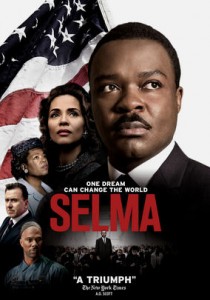Selma-2014
Director-Ava DuVernay
Starring-David Oyelowo, Carmen Ejogo
Scott’s Review #248
Reviewed June 19, 2015
Grade: A-
An Oscar-nominated factual feast, set in the mid-1960s during the Civil Rights movement, Selma is a re-telling of the life and times of Martin Luther King Jr. and the struggles that black Americans endured during a tumultuous period in history including dealings with then-President Lyndon B. Johnson and the famous and important 1965 Selma to Montgomery voting rights march, which led to the signing of the pivotal Voting Rights Act of 1965.
This film reminded me quite a bit of 2013’s The Butler in both subject matter and style- ironic since originally Lee Daniels was slated to direct and instead signed on for The Butler.
Both featured a charismatic and intelligent black man struggling with racial matters.
The film, despite being an independent undertaking, looked glossy and polished and quite reflective of the time. Similar to The Butler, Selma boasts a huge cast, historical political figures, and focuses on a tumultuous era in history.
Selma features a bevy of real-life figures from George Wallis to President Johnson to the obvious leader of the Civil Rights movement, Martin Luther King Jr., and his wife, Coretta Scott King, and the casting was very well thought out.
Tim Roth, David Oyelowo, Tom Wilkinson, and Carmen Ejogo all portray their roles professionally and passionately. None of the above received Oscar nominations and I am okay with that. I did not feel that any were definite standouts from a crowded field of talent, though perhaps Ejogo could have been in the running with her understated though compelling performance.
The drama surrounding the lack of scores of expected Oscar nominations is not shared by me. The truth is, the film was included in the Best Picture category and won Best Song.
While an emotional and compelling film, neither is it a masterpiece nor will change the art of cinema, though I must stress it is a very good film.
I found Selma to be an important film- a look back on history and the shame and humiliation placed on blacks who attempted to obtain voting rights- a heartbreaking scene depicts a determined woman (played by Oprah Winfrey) being denied this right by a cold and racist authority figure as she is asked impossible and tricky questions to prove her patriotism, which of course, she cannot possibly answer correctly.
Yes, the film is directed by a black, female director (Ava DuVernay) and yes, one might argue that it has a black point of view. However, the film successfully sympathetically portrays several white characters and avoids the assumption that all white people were racist in this period.
Let’s face it- racism still exists, especially in the south, and in the 1960s even more so. I did not find the message of the movie in black people vs. white people terms, but rather as a humanistic struggle for rights. And the struggles continue as the film makes abundantly clear in the message of the film.
While King was a life changer to the black people of the United States, his life was abruptly cut short in his prime. One wonders how much more good this man could have achieved.
The song “Glory” is an emotional, powerful number featured in the film and especially during the marching and subsequent slaughter scenes are highly emotional and effective.
And who will not become teary-eyed as the innocent marchers are beaten and treated like cattle, simply for taking a stand? One will gasp at the senseless bombing scene that rocks a building and takes four innocent little girls’ lives away with it.
Selma successfully transplanted me to a time that was before my time and made me appreciate and capture the positive and negative experiences of a race of people that was not too long ago.
This film both inspired and moved me and taught me what a movement occurred in 1965.
Oscar Nominations: Best Picture, Best Original Song-“Glory” (won)
Independent Spirit Award Nominations: Best Feature, Best Director-Ava DuVernay, Best Male Lead-David Oyelowo, Best Supporting Female-Carmen Ejogo, Best Cinematography
